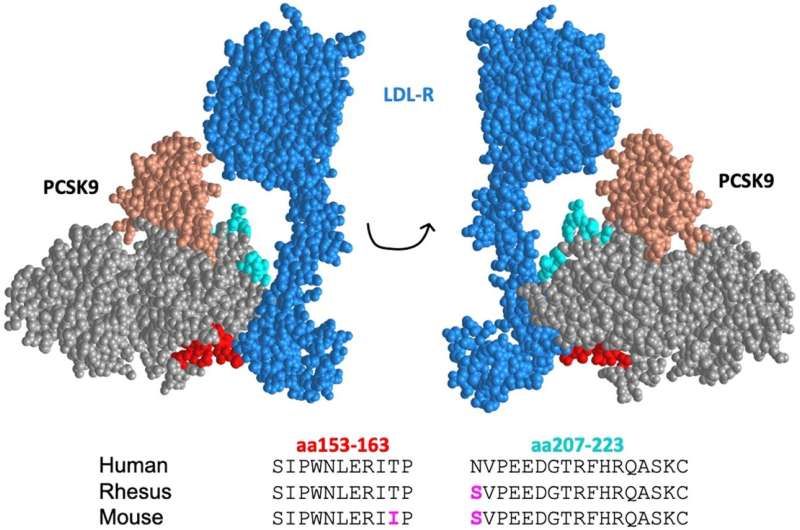This article has been reviewed according to Science X's editorial process and policies. Editors have highlighted the following attributes while ensuring the content's credibility:
fact-checked
peer-reviewed publication
trusted source
proofread
The future of heart health: Researchers develop vaccine to lower cholesterol

Nearly two in five U.S. adults have high cholesterol, according to the Centers for Disease Control and Prevention (CDC). Untreated, high cholesterol can lead to heart disease and stroke, which are two of the top causes of death in the U.S. Worldwide; cardiovascular diseases claim nearly 18 million lives every year, according to the World Health Organization.
A new vaccine developed by researchers at The University of New Mexico School of Medicine could be a game-changer, providing an inexpensive method to lower "bad" LDL cholesterol, which creates dangerous plaques that can block blood vessels.
In a recent study published in npj Vaccines, a team led by Bryce Chackerian, Ph.D., Regents' Professor in the Department of Molecular Genetics & Microbiology, reported the vaccines lowered LDL cholesterol almost as effectively as an expensive class of drugs known as PCSK9 inhibitors.
"We are interested in trying to develop another approach that would be less expensive and more broadly applicable, not just in the United States, but also in places that don't have the resources to afford these very, very expensive therapies," Chackerian said.
For a condition with such a profound global impact, one would think treatments for high cholesterol levels would be more accessible and affordable. Abinash Achrekar, M.D., MPH, learned firsthand that is not the case.
Achrekar, a cardiologist, is the vice chair and professor In the UNM Department of Internal Medicine. Not only has he treated countless patients with high cholesterol, he is a patient himself.
"I'm a cardiologist, and I have high cholesterol," he said. "I was actually diagnosed when I was a young man about the age of 16."
Since then, Achrekar said he has used different treatments, like statins—which close to 200 million people use worldwide—and the PCSK9 monoclonal shot. This is a newer medicine that targets the PCSK9 protein; a molecule made in the liver that circulates through the bloodstream and negatively regulates the metabolism of LDL cholesterol.
Basically, the more PCSK9 your body makes, the higher your LDL cholesterol will be. Achrekar said the twice-monthly injections to block that protein reduce his bad cholesterol by about 60%, but they are expensive and require prior authorization from a primary care doctor or cardiologist.
"They do take some time processing with the insurance companies, but they're life-saving," he said. "These medicines have been shown not only to lower cholesterol, but to reduce the chances of heart attack, stroke and dying."
Chackerian and his colleagues wanted all patients who face that risk to have a treatment option. So, using vaccine platform technology he developed at UNM, Chackerian partnered with researchers across the U.S. to create a new vaccine that specifically targets PCSK9.
"The vaccine is based on a non-infectious virus particle," he explained. "It is just the shell of a virus, and it turns out that we can use that shell of a virus to develop vaccines against all sorts of different things."
In this case, Chackerian said he stuck tiny pieces of the PCSK9 protein to the surface of these virus particles.
"So, your immune system makes a really strong antibody response against this protein that's involved in controlling cholesterol levels," he said. "In the animals that we vaccinated, we see strong reductions in cholesterol levels—up to 30%—and that is going to be correlated with reduced risk of heart disease."
Over the past 10 years, the vaccine has been tested on mice and monkeys with promising results. Chackerian said the next step is to find funding to move into vaccine manufacturing and clinical trials with humans. That process can take years and several million dollars, but it is worth it to develop a vaccine that is pure, safe and affordable.
"Given the fact that so many people have high cholesterol levels, it has been estimated that if everybody went on one of these PCSK9 inhibitor therapies, it would bankrupt the health care system," Chackerian said.
He estimates his vaccine could be cheaper than $100 per dose because it is made with a simple and relatively inexpensive bacteria.
"We're thinking tens of dollars a dose," he said, and each dose would remain effective for close to a year. "This is a vaccine that we think can have a global impact. So, not just in the United States, but around the world where heart disease is a significant problem."
Chackerian said his team continues to work hard on making that impact.
"We hope to have a vaccine in people in the next 10 years," he said.
More information: Alexandra Fowler et al, A virus-like particle-based bivalent PCSK9 vaccine lowers LDL-cholesterol levels in non-human primates, npj Vaccines (2023). DOI: 10.1038/s41541-023-00743-6





















